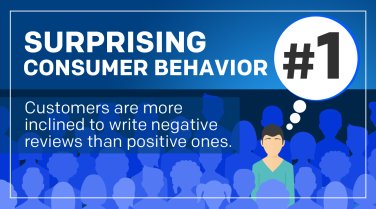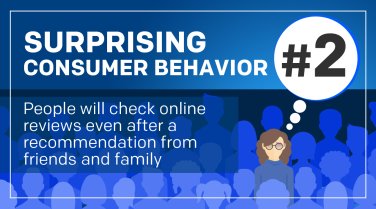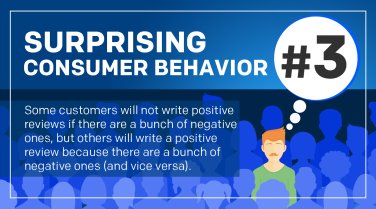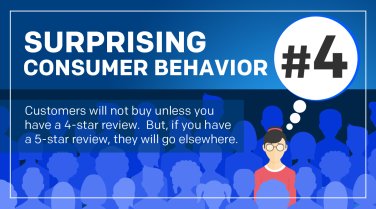Since customers are turning to the internet more and more and relying on online reviews to help them choose what product or service is best, you need a great online reputation to stay competitive. Otherwise, you are losing a lot of potential leads and even hurting your SEO and search rankings.
We are here to help you understand what is happening in the minds of your consumers when they read and write online reviews, so you can take this knowledge and apply it to your own online reputation strategy.
Let us begin with the why: As in, why do consumers write reviews in the first place?

Consumers write reviews if their experience with the company inspired a heightened emotion response -either positive or negative.
Writing a review is a way for consumers to stroke their ego, show-off expertise, or feel knowledgeable.


Reviews allow consumers to have a voice and be heard -they feel as if they are part of a larger community.
Consumers write reviews with the intention of influencing others, sometimes out of a need to feel powerful and sometimes out of an altruistic desire to help others.

REVENGE. Don’t panic, this is far from the most popular reason someone writes a review. Only about 20% of negative reviews come from a feeling of vengeance. However, it is important to differentiate between when someone is writing an honest critique and when someone is being a cyber bully or “troll.” The first you can respond to and ensure customer service follow-up. The other may require removal services.
Now that we have a general background on why consumers write reviews, it is time to delve deeper. Below, we have identified four surprising consumer behaviors and explain why they happen!
Surprising Consumer Behavior #1: Customers are more inclined to write negative reviews than positive ones.
This is because people are more affected by bad experiences than good ones. Say you found $50 on the street. Your day got a little better, yes? Now imagine you lost $50. This may ruin your whole day and even stay with you throughout the week.
So, why do we take bad experiences so much more to heart than good ones?
Our brain. It handles positive experiences in one hemisphere and negative experiences in the other. Due to this separate treatment, negative emotions are processed more thoroughly than positive emotions. We also tend to use stronger words to describe our negative emotions, which in turn makes them seem more dramatic and urgent than our positive emotions.
Since these negative emotions last longer, inspire a heightened emotional reaction, and are in the forefront of our thoughts, we are way more likely to write a review about this dramatic negative moment than an easily forgotten positive one.
It still begs the question, why are our brains wired to put so much emphasis on negative experiences? Well, evolution may be the answer. In the past to survive we needed to be highly aware of threats and negative outcomes (aka. being eaten by something bigger than us). Those people who devoted more thought to negative experiences used that information to survive longer and procreate.
Since one bad experience usually wins out in the customer’s mind over one good experience, you’re going to need a larger number of good reviews than bad ones to tip the balance in your favor. Our recommended ratio is 10-12 good reviews for every bad one.
Furthermore, there is a stigma on the intellectual value of criticism versus compliment. We often consider people who say negative things as more intelligent than those who say positive things. Therefore, we give negative reviews higher importance in our mind. This attitude makes it even more difficult to write a positive review amidst a plethora of negative ones. It also means that when we write reviews, we might use critique to sound smarter.
Surprising Consumer Behavior #2: People will check online reviews even after a recommendation from friends and family
Yes, word of mouth and trusted recommendations from loved ones still impact a customer’s decision. However, this one recommendation isn’t enough anymore for customers to go buy a product. They still turn to online reviews for confirmation, for an unbiased opinion, and for peace of mind that this purchase isn’t one they will regret.
The real question here is: Why is one person’s recommendation (especially a trusted family member’s or friend’s) not enough? Why do we need the opinion of other people we don’t know?
Prepare for a terrible flashback to Middle School: the answer is popularity.
Studies have shown that when two products have similar ratings, customers will choose the products with more reviews. This type of thinking is rather illogical. The product with fewer reviews has a chance of being a better product, since the bad reviews could be an unrepresentative small group dragging the overall rating down. Whereas the product with more reviews needs a substantial amount of bad reviews to get the same rating. Nevertheless, customers feel more comfortable with a product more people are buying, than with a higher quality product. Hence, popularity or herd mentality -going along with the group.
You may be thinking, consumers are independent people most likely out of middle school by now. Well, yes and no. Some people will diverge from this pattern (check out our discussion of powerful vs. powerless personalities below!). However, online reviews have become a terribly influential form of social proof.
Social proof is a scientific term for the psychological phenomenon in which people look at the actions of others to learn the appropriate behavior for different situations. And yes, this extends to the internet. So, one person’s opinion, no matter how trustworthy, is not sufficient social proof.
Finally, with the internet being a wealth of information, we are used to doing easy research on any topic. A recommendation can get customers interested in your product or service, but the online reviews will determine if they go forward and buy.
Surprising Consumer Behavior #3: Some customers will not write positive reviews if there are a bunch of negative ones, but others will write a positive review because there are a bunch of negative ones (and vice versa).
We literally just talked about the impact of popularity and social proof, so the first part of this shouldn’t come as a surprise, but the second part seems a little contradictory. Don’t worry, we can explain why both these behaviors happen and which consumers to keep an eye on.
There is a study published in the Journal of Service Research that differentiates between “powerless” consumers and “powerful” consumers. The “powerless” consumers are the ones likely to follow suit, as in write a positive review if the reviews are mostly positive or a negative review if the reviews are mostly negative. The “powerful” consumer will go against the grain. They often have high helpful ratings or elite reviewer status and will write a positive review in a sea of negative and vice versa. Why do these consumers act this way?
The study cites self-enhancement theory as the reason. This theory suggests that the motivation for writing online reviews is to enhance self-worth. The “powerful” consumers want to go against consensus to boost their self-image of independence. Contrarily, the “powerless” consumers agree with the consensus to enhance their self-image of being part of a community.
When you look through your own customer reviews, you will see these behaviors play out. So, if you already have a lot of positive reviews, your ideal reviewer would be a “powerless” consumer. If you have a lot of negative reviews, you need to target the “powerful” consumer.
Surprising Consumer Behavior #4: Customers will not buy unless you have a 4-star review. But, if you have a 5-star review, they will go elsewhere.
Okay, so the first part of this makes sense. A 4-star review means that most reviews were highly rated. The positive reviews outweigh the bad ones, indicate popularity, and inspire more good reviews. So far, so good.
But what is the problem with 5-star reviews? Isn’t that what we are aiming for? Is there such a problem as too much of a good thing?
Abso-frickin-lutely.
Here’s the thing. While customers put a substantial amount of trust in customer reviews (as noted earlier), they know reviews aren’t infallible. When products or services have zero negative reviews or critiques, well, a customer’s spidey sense tingles. The reviews begin to sound paid for or fake.
If we can use another trite phrase, we will call this the “too good to be true” syndrome. The customer is uncomfortable not knowing what the possible fault in the product is, and they don’t want to be the guinea pig testing out the inevitable shortcomings. Too many 5-star reviews without a few negative or critical ones cause the customer to mistrust the product.
This leads to the tricky situation of actually needing some negative reviews. And it begs the question, what kind of negative review is helpful to a company?
Two big things here. The first, is that negative or critical reviews make the customer feel like they know what they are getting into -there won’t be any surprises when they buy this product or service. They trust the product’s rating. However, you still need an overall rating of 4-stars to get the buy. A majority of negative reviews and customers will trust the reviews, but will obviously move on from your product or service.
The second thing, is that customers use negative reviews to not only see what is problematic about the product, but also to see if that problem applies to them. Which means, the negative review can actually reaffirm that the product is right for the customer, as long as the problem is something the customer sees as a minor inconvenience or something that doesn’t affect them.
For example, say you are looking for a water bottle to use at work, because staying hydrated is important but hard (does coffee count as water?). Overall the water bottle has good reviews, but there are a few 2 or 3-star reviews, and some 4-star reviews with slight criticisms. If you read the criticisms and they say the water bottle altered the taste of the water, was impossible to open or made weird noises when you drank out of it -those might be deal breakers. However, if the critiques were the color was a little washed out, this water bottle didn’t fit in the pocket of my backpack, or I am not a fan of the pop-up top and would prefer a sliding drinking mechanism -you might be more interested in the water bottle, because all its problems do not apply to you. (Unless you really did care about the color, or jogging, or the way the water came out.) You feel like the water bottle now fits YOUR personalized style, and that makes it more appealing.
The negative reviews have now also transformed into positive reviews – they show the customer that the product has been customized to meet their needs, not everyone else’s.
What should you do now?
Consumers exhibit some surprising behaviors, some of which work against you in your goal to have a good online reputation. However, understanding these behaviors leads you to understanding why they write the reviews they do. Knowing your customers means you can better communicate with them and improve relations, so that those reviews are more positive than negative, and you get that 4-5-star rating!
Customer reviews are an integral part of your marketing, and you can’t afford to take them lightly or ignore them. Consumers may be a bit contradictory at times, but there are general practices you can put into place that ensure your reviews are positive and turn leads into conversions. Click here to learn about National Strategic’s best practices for building an awesome online reputation!

I wish you had commented on what you can say when you don’t have a good thing to say without being so extremely ugly about it.
He treated me like a “woman with no common sense” and tried to oversell and replace something that was already new and in working condition and ignored the problem I was having with my plumbing.
no studys linked. Useless.
My question is how are companies now supposed to deal with this? The whole review system becomes flawed now then. Its true people turn online to vent their anger rather to vent their joy resulting in a bias of negative reviews while in reality after knowing how many ordered from the site in totaly the ratio might have been 30% negative compared to lets say 80% like it seems.
Site like trustpilot, Google and what not need to take in account how many products and services has been bought in realtime totally from the company so future customers can get an idea whats up. The star rating is completely inaccurate and is judging by the users logged in to the review site, NOT logged in to the actual company.
I think it’s funny that people are reviewing the article about customer reviews! Is there no end to human opinions? Try practicing not having opinions.
Ohh the irony hahaha